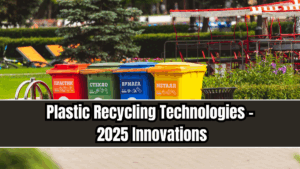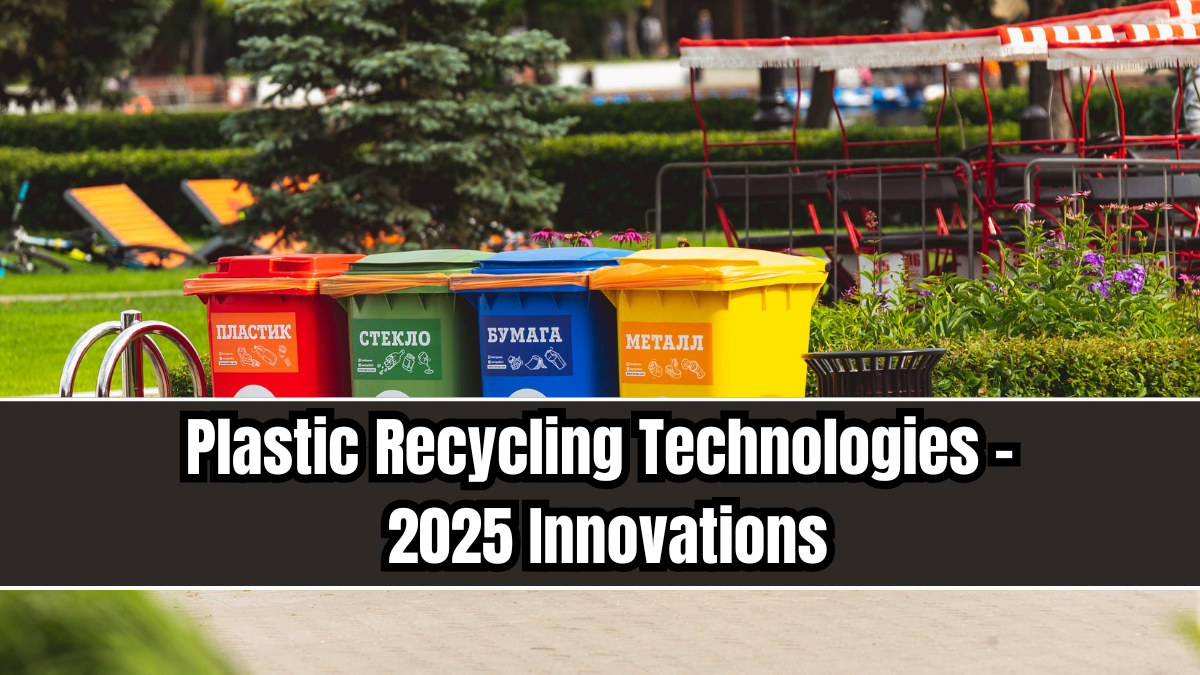The global fight against plastic waste has reached a turning point, and in 2025, Plastic Recycling Technologies 2025 are redefining how the industry handles sustainability. With increasing government regulations, consumer awareness, and corporate responsibility, innovative recycling methods are transforming waste into valuable resources. These breakthroughs not only reduce environmental impact but also open new avenues for economic growth.

Why Recycling Plastics Matters
Plastic pollution remains one of the world’s biggest environmental challenges. Billions of tons of plastic end up in oceans and landfills, threatening ecosystems and human health. Recycling technologies are essential because they:
-
Reduce dependency on virgin plastic production
-
Cut greenhouse gas emissions
-
Promote circular economy practices
-
Generate new raw materials for industries
-
Lower waste management costs
Latest Recycling Technologies in 2025
The plastic recycling industry in 2025 is adopting a mix of advanced processes, combining science and technology for maximum efficiency. Key innovations include:
-
Chemical Recycling (Depolymerization): Breaks plastics down to their base monomers, allowing infinite recycling without loss of quality.
-
Pyrolysis Technology: Converts mixed plastic waste into fuel, creating an alternative energy source.
-
Biodegradable Plastics Recycling: Specialized facilities designed to process bioplastics without contamination of traditional recycling streams.
-
AI-Powered Sorting Systems: Uses robotics and machine learning to separate plastics by type and grade more accurately.
-
Microbial & Enzyme-Based Recycling: Harnesses biological processes to naturally break down plastics at faster rates.
-
Closed-Loop Recycling Models: Ensures packaging materials are reused multiple times within the same supply chain.
Industry Adoption and Global Impact
Industries worldwide are embracing sustainable solutions by partnering with recycling innovators. Consumer goods companies, packaging giants, and automotive manufacturers are investing in recycled plastics to meet sustainability goals. In India, new public-private partnerships are driving large-scale adoption of advanced recycling plants, supported by government subsidies and policies.
Globally, chemical recycling plants are expanding, especially in the USA and Europe, while Asia is focusing on AI-driven sorting and mechanical recycling upgrades.
Benefits of Plastic Recycling Technologies
-
Environmental: Significant reduction in plastic pollution and carbon footprint
-
Economic: Creation of new industries and jobs in the recycling sector
-
Industrial: Supply of cost-effective recycled raw materials for packaging, textiles, and construction
-
Social: Better waste management in cities and improved community health
Challenges in Implementation
Despite rapid innovation, challenges remain:
-
High initial investment in advanced recycling plants
-
Limited awareness among smaller businesses and local bodies
-
Difficulty in recycling multi-layered or contaminated plastics
-
Need for stronger regulatory frameworks and consumer participation
Final Thoughts
The Plastic Recycling Technologies – 2025 Innovations demonstrate how science and sustainability are reshaping the plastic industry. With governments, industries, and communities working together, these innovations promise a cleaner environment and a stronger circular economy. The future of recycling is not just about reducing waste—it’s about turning it into opportunity.
FAQs
What is chemical recycling in plastics?
Chemical recycling breaks down plastics into their base monomers, allowing them to be reused in creating new, high-quality plastics.
How does AI improve plastic recycling?
AI-powered sorting systems can identify, separate, and categorize different types of plastics with high accuracy, increasing recycling efficiency.
Are biodegradable plastics recyclable?
Yes, specialized facilities in 2025 can recycle biodegradable plastics separately to prevent contamination of traditional recycling streams.
What are the main benefits of plastic recycling technologies?
They reduce pollution, cut carbon emissions, provide raw materials for industries, and support the circular economy.
Is plastic-to-fuel technology widely used in 2025?
Yes, pyrolysis and similar technologies are being adopted globally to convert non-recyclable plastics into usable fuels.
Click here to know more.
